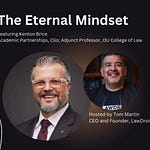Hey there Legal Rebels! 👋 I'm excited to share with you the 26th episode of the 2025 season of the LawDroid Manifesto podcast, where I will be continuing to interview key legal innovators to learn how they do what they do. I think you're going to enjoy this one!
If you want to understand the critical role that Legal Services Corporation plays in delivering justice to millions of Americans and why the current budget threat could devastate access to justice for our most vulnerable citizens, you need to listen to this episode. Ron is at the forefront of civil legal aid and brings decades of experience from both private practice and public service to this vital mission.
Transforming Access to Justice Through Civil Legal Aid
Join me as I interview Ronald Flagg, President of Legal Services Corporation.
In this powerful podcast episode, Ron shares his journey from growing up in Milwaukee as the son of Holocaust survivors to becoming a civil rights advocate at Harvard Law School, then spending 30 years at Sidley Austin championing pro bono work before leading the nation's largest funder of civil legal aid. He reveals the stark reality that 74% of Americans living in poverty face at least one civil legal issue each year, yet over 90% of these problems go unaddressed due to insufficient funding.
His stories underscore the human impact of civil legal aid, from Victoria who escaped domestic violence with her two-year-old son, to Larry the Navy veteran who reclaimed his hurricane-damaged home, to a child in Georgia who received life-saving treatment for sickle cell anemia. This episode is essential listening for anyone who wants to understand how our justice system truly works and why LSC's potential budget elimination would devastate millions of Americans.
The Skinny
Ronald Flagg, President of Legal Services Corporation, shares his remarkable journey from the son of Holocaust survivors in Milwaukee to leading the nation's largest funder of civil legal aid. Shaped by his parents' experiences of being denied civil rights in Nazi Germany, Ron developed a lifelong commitment to justice that led him through Harvard Law School, 30 years at Sidley Austin where he championed pro bono work, and ultimately to LSC where he oversees funding for 130 legal aid programs serving every zip code in America. The conversation reveals the staggering scope of the justice gap: 74% of Americans living in poverty face civil legal issues annually, yet over 90% receive inadequate or no legal assistance. With LSC's funding threatened by proposed budget cuts, Ron explains how eliminating the $560 million appropriation would deny legal aid to over 200,000 domestic violence survivors, 44,000 veterans, and more than a million children, while LSC's programs currently deliver a 7-to-1 return on investment to the economy.
Key Takeaways:
• Legal Services Corporation funds 130 legal aid programs across every congressional district and zip code in America, granting out 94% of its federal appropriation directly to these programs
• 74% of Americans living under 125% of the federal poverty level face at least one civil legal issue annually, with 50% facing five or more such issues
• Over 90% of civil legal problems affecting low-income Americans do not receive adequate legal assistance, creating what experts call "the justice gap"
• LSC-funded programs currently turn away half the people who reach their doors due to insufficient resources, demonstrating massive unmet need
• Every dollar invested in civil legal aid generates approximately $7 in economic return through prevented homelessness, maintained employment, and reduced burden on public services
• The current administration has proposed eliminating LSC's entire budget, which would devastate services for over 200,000 domestic violence survivors, 44,000 veterans, and more than a million children
• Civil legal problems cluster together - survivors of domestic violence typically face 5-10 additional legal issues annually including housing, employment, family, and health challenges
• LSC enjoys strong bipartisan support in Congress, with over 100 general counsels from major corporations, 37 state Supreme Court chief justices, and 40 state attorneys general advocating for robust funding
Notable Quotes:
"The quality of justice in America should not turn on whether or not you had the money to hire a lawyer." - Ronald Flagg (22:48-22:51)
"We grant away 94% of the federal appropriation we get to legal aid programs in every zip code in America." - Ronald Flagg (05:05-05:09)
"For every $1 in civil legal aid funding, that yields an average $7 return to the economy." - Ronald Flagg (05:50-05:56)
"74% were confronted by at least one civil legal issue every year. I think it was something like 50% had five or more civil legal issues every year." - Ronald Flagg (27:58-28:05)
"Over 90% of the problems, the sorts of problems we're talking about, evictions, child custody cases, veterans benefit cases, over 90% of those problems do not get either any or certainly all of the help that is needed to fully deal with them." - Ronald Flagg (29:02-29:10)
"Programs we fund turn away half the people who make it to their door." - Ronald Flagg (35:01-35:03)
"We have a court system that was designed by lawyers on the assumption that people would have lawyers in using the system. If LSC is eliminated, the people who today get legal aid will be using a system with both hands tied behind their back and blindfolded." - Ronald Flagg (45:28-45:50)
"Having a job where at least some part of every day I feel helpful is a blessing beyond measure." - Ronald Flagg (50:20-50:31)
Clips
Introducing LSC: Ensuring Civil Legal Aid for All
Real Stories That Show the Impact of Legal Aid
Why Civil Law Doesn’t Guarantee A Lawyer
The Big ROI of Fully Funding Legal Aid
Ron's journey from Milwaukee to leading LSC exemplifies how personal experience with injustice can fuel a lifetime of advocacy. His parents' escape from Nazi Germany instilled values that carried through his distinguished legal career, from pro bono leadership at a major law firm to stewarding the nation's commitment to equal justice. The statistics he shares paint a sobering picture: in the world's wealthiest nation, millions face legal crises that could destroy their lives while lacking access to basic legal assistance.
What makes this episode particularly urgent is the current threat to LSC's existence. The proposed budget elimination would not only abandon millions of vulnerable Americans but also undermine the economic stability that legal aid provides to communities nationwide. Ron's calm determination in the face of this challenge reflects both his decades of experience and his unwavering belief that justice must be accessible to all Americans, regardless of their ability to pay.
Closing Thoughts
As someone who's spent years working in legal technology, I'm struck by Ron's reminder that behind every innovation and efficiency gain, there are real people facing real crises. His stories of Victoria, Larry, and the child in Georgia aren't just compelling anecdotes, they represent millions of Americans whose lives hang in the balance of funding decisions made in Washington.
What resonates most deeply is Ron's point about the knowledge gap that exists alongside the justice gap. Most Americans, influenced by decades of Law & Order episodes, assume legal representation is guaranteed in all serious matters. The reality is starkly different: if you're facing eviction, losing custody of your children, or fighting for veterans benefits, you're largely on your own unless you can afford a lawyer or find one of the overwhelmed legal aid programs that LSC funds.
The bipartisan support Ron describes, from corporate general counsels to state attorneys general to Supreme Court chief justices, demonstrates that this isn't a partisan issue. It's about the fundamental promise of equal justice under law. When 40 state attorneys general agree on anything, as Ron noted with characteristic wit, we should pay attention.
For our Legal Rebels community, this episode serves as a crucial reminder that access to justice isn't just about having the right technology or the most efficient processes. It's about ensuring that our justice system serves everyone, not just those who can afford it. The 7-to-1 return on investment that civil legal aid provides isn't just good economics, it's the foundation of a stable, just society.
The threat to LSC's funding represents more than a budget cut; it's a test of our national commitment to the rule of law. As Ron's parents understood after escaping Nazi Germany, a society that denies justice to some ultimately denies justice to all.












